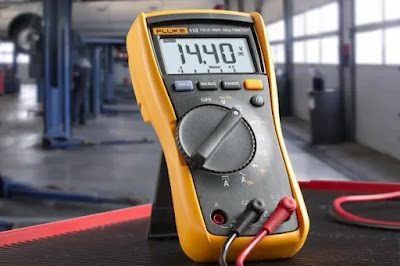A multimeter, short for "multiple meters," is an essential and versatile electronic measurement tool used in a wide range of fields, including electronics, electrical engineering, automotive maintenance, and general electrical troubleshooting. It serves as an all-in-one device for measuring various electrical parameters, making it an indispensable tool for professionals and hobbyists alike.
Iconic Engineering Limited is a Fluke distributor in Bangladesh, They supply electrical measuring instruments in Bangladesh. Fluke thermometer, multimeter, clamp meter, power quality analyzer, and all types of industrial purpose use meter.
Here are the key functions and features of a typical multimeter:
Voltage Measurement:
Multimeters can measure both AC (Alternating Current) and DC (Direct Current) voltage. This is crucial for checking the voltage level in electrical circuits, outlets, batteries, and power supplies.
Current Measurement
Multimeters allow you to measure the current flow in a circuit. They can measure both AC and DC current, which is vital for assessing the current consumption of devices and components.
Resistance Measurement:
Multimeters can determine the resistance of a component or a resistor. This is particularly useful for identifying faulty or damaged resistors in electronic circuits.
Continuity Testing:
Multimeters have a continuity testing function, which emits an audible beep or displays a value when a circuit is closed or "shorted." This is often used to check for breaks or faults in wiring and connections.
Diode Testing:
Multimeters can test diodes and semiconductors. They typically display a voltage drop across the diode when connected in the appropriate mode.
Capacitance Measurement:
Some advanced multimeters can measure capacitance, allowing users to check the capacitance value of capacitors in electronic circuits.
Frequency Measurement:
Multimeters can be used to measure the frequency of an AC signal, making them useful for tasks such as troubleshooting electronic devices or tuning circuits.
Temperature Measurement:
Some multimeters come with a temperature probe, which enables temperature measurement in both Celsius and Fahrenheit. This is valuable for applications in HVAC, automotive, and electronic component testing.
Data Logging:
Modern multimeters often feature data-logging capabilities, allowing users to record and analyze measurements over time. This is beneficial for diagnosing intermittent electrical issues.
Auto-ranging vs. Manual-ranging: Multimeters can be auto-ranging, meaning they automatically select the appropriate range for a measurement, or manual-ranging, where the user must select the range. Auto-ranging multimeters are more user-friendly for beginners.
 |
| Digital Multimeter |
Display:
Multimeters typically have a digital LCD display for showing measurement values. Some models may offer additional features, such as backlit displays for improved visibility in low-light conditions.
Safety Features:
Multimeters are equipped with safety features like overload protection, fuse protection, and rugged, durable enclosures to prevent damage or injury in the event of high-voltage or high-current measurements.
Multimeters come in various models, from basic units suitable for hobbyists to more advanced, high-precision devices designed for professionals in fields like electronics and electrical engineering. When using a multimeter, it's essential to follow safety precautions, select the correct measurement range, and ensure that you're using the right probes for the job.
A multimeter is an indispensable tool for anyone working with electrical and electronic systems. It enables precise measurement of voltage, current, resistance, and various other parameters, making it an essential instrument for diagnosing, repairing, and maintaining electrical and electronic equipment.
Comments
Post a Comment